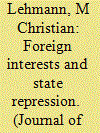| Srl | Item |
| 1 |
ID:
190842


|
|
|
|
|
| Summary/Abstract |
Existing work seeks explanations for state repression mainly in domestic factors such as ethnic/religious cleavages, poverty and inequality, struggle for power, regime type and quality of state institutions, lack of loyalty, demand for scapegoats, and cultural or psychological traits of perpetrators. How foreign influences shape state repression has been given less attention. Furthermore, the focus of the empirical literature has been largely cross-country, leaving much local variation unexplained. In this article, I examine how far foreign interests can explain the local (spatial) variation of deportations and massacres during the Armenian genocide. Between 1915 and 1917 the Ottoman Empire carried out a massive campaign of state repression (deportations and massacres) against its Armenian population. There was meaningful variation across Ottoman provinces in the intensity of this campaign, that is, some provinces experienced more repression than others. I investigate the determinants of this spatial variation. My empirical analysis is guided by a rationalist (economic) model where deportation is a tool to stifle Armenian calls for independence, but the benefit and cost of deportation vary spatially. For example, deportation is costlier (i.e. the risk of foreign intervention is greater) in locations where foreign economic and military interests are threatened by the departure of Armenians. In line with the model’s predictions, my empirical analysis indicates that there were fewer deportations in places where Armenians worked for the German-owned railway.
|
|
|
|
|
|
|
|
|
|
|
|
|
|
|
|
| 2 |
ID:
172327


|
|
|
|
|
| Summary/Abstract |
This article examines whether refugees are prime candidates for recruitment into armed groups and whether humanitarian aid to refugees impacts their choice to join armed groups. First, our original survey data of 1,358 Syrian households in Lebanon provide evidence that mobilization among the refugee population is low at baseline—the first empirical estimates of the magnitude of the rate of Syrian refugees returning home to fight. Second, leveraging as-if random assignment around a strict altitude cutoff for a United Nations cash transfer program for Syrian refugees, we find little evidence that the aid program had a large effect on mobilization. If anything, our estimates indicate a small decrease in mobilization. Our results stand in contrast to published literature arguing that refugees are prime candidates to join armed groups and humanitarian aid to refugees may support armed groups and fuel recruitment.
|
|
|
|
|
|
|
|
|
|
|
|
|
|
|
|
| 3 |
ID:
182557


|
|
|
|
|
| Summary/Abstract |
I present evidence that U.S. aid for refugees mitigates civil conflict in their origin country. My main result is that a 10 percent increase in U.S. humanitarian aid for refugees reduces conflict deaths in their origin country by 1.5 percent. Presumably, aid for refugees entices civilians to flee from the location of conflict, thus depriving armed groups of resources and targets.
|
|
|
|
|
|
|
|
|
|
|
|
|
|
|
|